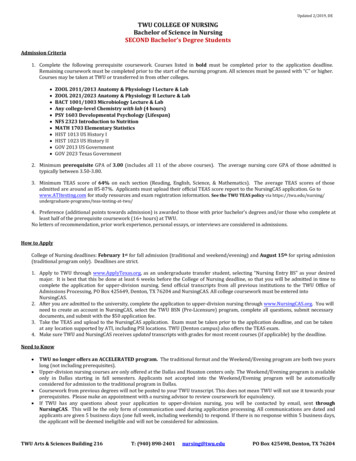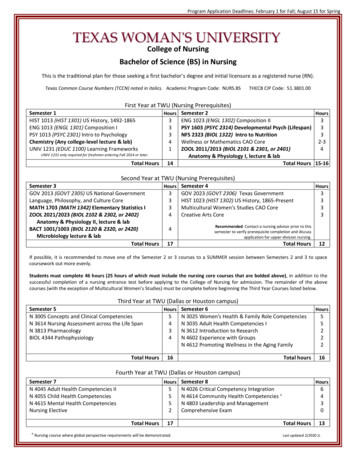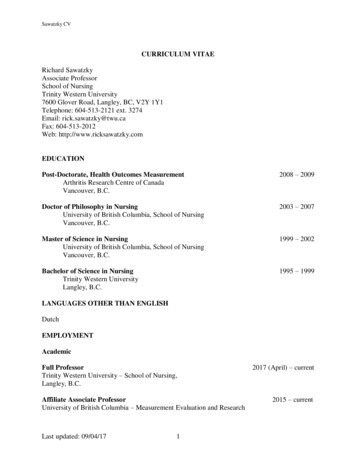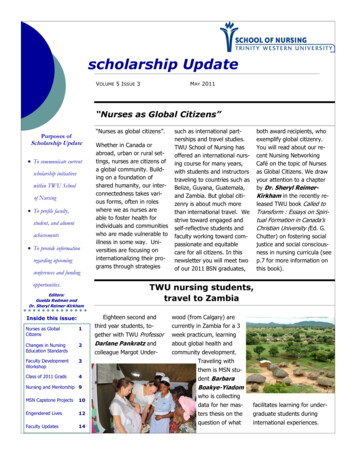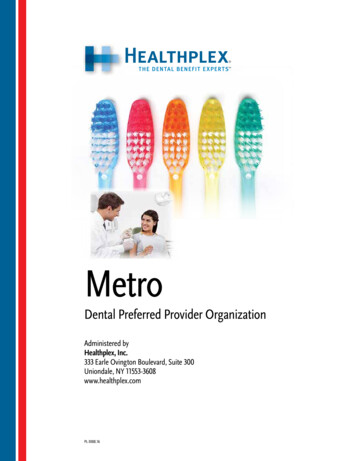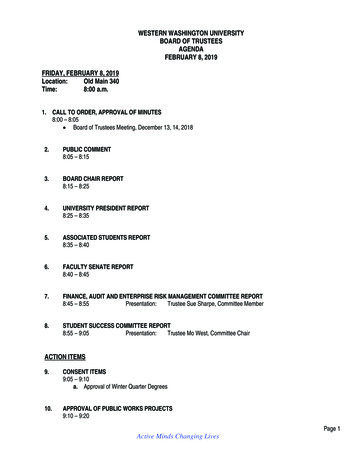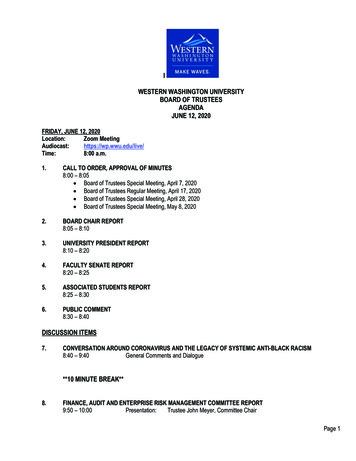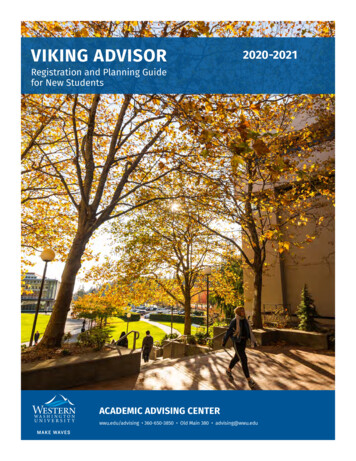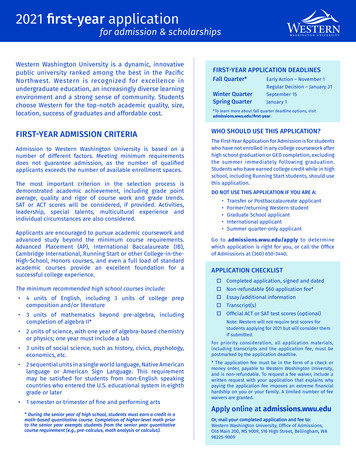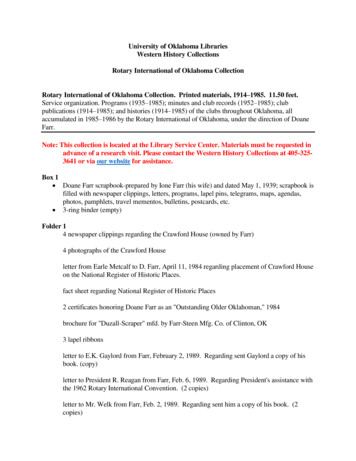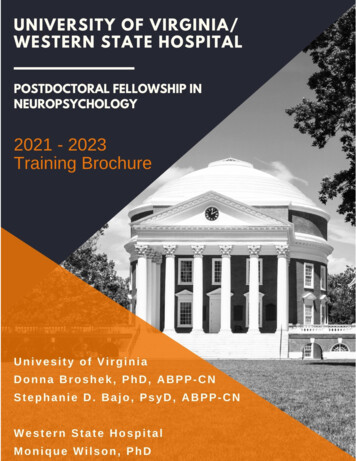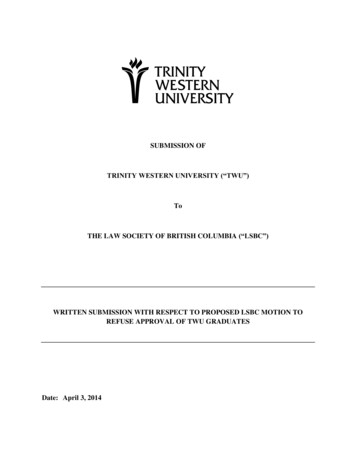
Transcription
SUBMISSION OFTRINITY WESTERN UNIVERSITY (“TWU”)ToTHE LAW SOCIETY OF BRITISH COLUMBIA (“LSBC”)WRITTEN SUBMISSION WITH RESPECT TO PROPOSED LSBC MOTION TOREFUSE APPROVAL OF TWU GRADUATESDate: April 3, 2014
2CONTENTSPAGE1.INTRODUCTION AND EXECUTIVE SUMMARY. 32.TRINITY WESTERN UNIVERSITY . 5(a) Introduction . 5(b) Academic Excellence . 6(c) Community Engagement: Making a Difference . 7(d) Private Religious Educational Community. 93.THE SCHOOL OF LAW PROPOSAL . 11(a) The Proposal for a School of Law . 12(b) The Federation Process and Approval . 13(c) The Federation’s Special Advisory Committee . 15(d) The Ministry Process and Approval . 16(e) Conclusions from the Reviews . 174.MAINTAINING THE NATIONAL STANDARD . 18(a) The National Standard is an Important Aspect of Public Interest Regulation . 18(b) Harm to National Standards and Labour Mobility Obligations . 225.NATURE OF THE DECISION BEFORE THE LSBC. 236.SHOULD THE LSBC DENY TWU GRADUATES THE RIGHT TOPRACTICE LAW? . 25A. Legal Considerations: TWU v. BCCT is Binding Law . 26B. Evidentiary Considerations: No Evidence of Harm. 32C. Policy Considerations: Allegations of Discrimination, Freedom of Religion,Diversity and Academic Freedom . 36D. Practical Considerations. 417.COMMUNITY COVENANT QUESTIONS AND POSSIBILITYOF A CONDITIONAL APPROVAL . 458.SUMMARY AND CONCLUSION . 48
31.INTRODUCTION AND EXECUTIVE SUMMARYTWU has been working for many years to establish a School of Law that will educate itsstudents to the highest educational and ethical standards and equip them to serve theircommunities. TWU’s efforts have produced a proposed School of Law that has been carefullyassessed and approved by those with the responsibility to evaluate it.On April 11, 2014, the Benchers will consider a motion (the “Motion”) declaring that TWU’sSchool of Law is not approved as a common law faculty of law under LSBC Rule 2-27(4.1).TWU is a religiously based educational community, as mandated by the Legislature of BC. TWUmaintains a Community Covenant that implements its religious faith and objectives. TWU hasestablished a reputation for academic excellence and successfully operates a number of otherprofessional programs.While the LSBC is charged with regulating the legal profession in British Columbia in the publicinterest, the scope of the Motion is with respect to the academic qualifications of graduates fromTWU’s School of Law. This is because Rule 2-27(4.1) was promulgated under ss.20(1)(a) and21(1)(b) of the Legal Profession Act and specifically to determine whether applicants haveacademic qualifications under Rules 2-27(3)(b) and (4).The LSBC, together with all other law societies in Canada, approved a national requirement thatreflects their collective view as to what is necessary to ensure that graduates of law degreeprograms in Canada are competent to practice and meet their professional and ethicalobligations.TWU has established beyond any question that its School of Law meets all applicable academicrequirements and that students will receive a high quality education that includes bothsubstantive and ethical components. TWU has met all of the criteria of the national requirement.Its proposed School of Law has also been approved by a Special Advisory Committee of theFederation of Law Societies of Canada (the “Federation”) that was charged with consideringaspects of its Community Covenant. The School of Law has also received approval afterextensive review by the Ministry of Advanced Education (the “Ministry”).TWU respectfully suggests that appropriate regard be paid to the substantial work carried out bythe Federation and the Ministry. Other law societies have indicated that they will recognize andenrol TWU graduates. As a result:(a) A refusal by the LSBC to do the same has the potential to seriously damage andundermine the considerable work done by all of the law societies and the Federationto establish and accept a uniform national requirement; and
4(b) The LSBC will be obligated to recognize TWU graduates that become lawyerselsewhere in Canada as a result of its obligations under labour mobility agreementsand the Labour Mobility Act.There is no legitimate public interest in passing the Motion to refuse accreditation of TWUgraduates. TWU embraces its obligations to teach Canadian equality law and professionalethics, including equality based on sexual orientation. All of the evidence unequivocallyindicates that graduates from TWU’s School of Law will be properly educated in substantive lawand prepared to meet their professional and ethical obligations.In any event, the Federation’s process involves annual monitoring to ensure that TWU continuesto meet the national requirement and lives up to its commitments and obligationsTWU urges the LSBC to protect the values of a truly free Canada in which a wide variety ofbeliefs, “customs and codes of conducts”1 are accommodated and respected. Much of theopposition to TWU’s proposal is based on prejudicial caricatures and unfair assumptions aboutTWU and the members of its religious community. The objections to TWU’s CommunityCovenant are in many cases based on intolerance towards the Christian beliefs that TWU’scommunity seeks to uphold. The underlying notion that a student agreeing to maintain aChristian code of conduct cannot learn to be an excellent lawyer should be offensive to anyonewho values the freedom of religion and religious equality rights in Canada.By implementing its religious beliefs and mandate, TWU is only doing what it has beenlegislatively chartered to do, and in a manner authorized by law. A refusal to recognize TWUgraduates because of the Community Covenant would violate Charter rights and values,including those rights and freedoms guaranteed under s.2(a) (freedom of religion), s.2(d)(freedom of association) and s.15 (equality and non-discrimination on the basis of religion).With as many as 100 TWU graduates already practicing law, it has already been proven thatstudents can become excellent lawyers without abandoning their Christian faith or compromisingthe profession’s ethical standards.The history of this application and of TWU’s previous struggle to overcome objections to itseducation degree granting program should cause the LSBC to be very reluctant to overturn thesubstantial process that has already occurred. Giving effect to the opposition would repeat thevery wrong that occurred in the case involving the British Columbia College of Teachers with nolegitimate purpose or effect.1These terms are taken from the leading decision on freedom of religion by the Supreme Court of Canada in Big MDrug Mart [1984] S.C.R. 295 at 336.
52.TRINITY WESTERN UNIVERSITY(a) IntroductionTWU was originally founded in 1962 as a junior college. In 1969, the B.C. Legislature passedthe Trinity Junior College Act2, mandating that TWU’s education would be provided “with anunderlying philosophy and viewpoint that is Christian”. The Legislature gave TWU the privilegeto grant degrees in 19793 and in 1984 TWU became a member of the Association of Universitiesand Colleges of Canada.In 1985, the Legislature changed the name of the college to TWU and granted it authority tooffer graduate degrees4.TWU now offers 42 undergraduate majors. It has 17 graduate programs. It servesapproximately 4,000 students per year and it has over 22,000 alumni. It is a vibrant andsuccessful religious educational community.Many of TWU’s students are in its professional programs. TWU has a professional School ofNursing (M.Sc.N., B.Sc.N.), which was established in 1993 and is approved by the College ofRegistered Nurses of British Columbia5.It also has a School of Education (B. Ed.) and its teacher education program leads to a BritishColumbia Professional Teaching Certificate issued by the B.C. Teacher Regulation Branch. TheSchool of Education was recently approved to offer an M.A. degree in Education Studies(Special Education).TWU has other professional programs including Business (M.B.A., B.B.A., B.A.), Leadership(M.A.) and Counselling Psychology (M.A.).TWU’s main campus is in Langley, British Columbia. It offers all of the facilities and servicesof a modern, advanced and sophisticated university setting. It has residences, food services,fitness facilities, advanced laboratories, and performing arts facilities. It operates a highlysuccessful C.I.S. Athletics program that has won eight national team championships in the lastdecade.TWU operates an extension campus in Washington State and the Laurentian Leadership Centrein Ottawa. It also has two ecological research areas (Crow’s Nest Ecological Research Area onSalt Spring Island and Blaauw’s Eco Forest in Langley, BC). TWU was also recently granted2S.B.C. 1969, c.44Trinity Western College Amendment Act, 1979, S.B.C. 1979, c.374Trinity Western College Amendment Act, 1985, S.B.C. 1985, c. 635TWU is a member of the Canadian Association of Schools of Nursing3
6approval by both the Ministry and the Chinese government to offer an M.B.A. program inTianjin, China.(b) Academic ExcellenceThere is little dispute that TWU and its students perform exceptionally well academically. Thisis in part because over 80% of TWU full-time faculty have doctorates.TWU has built a reputation for academic quality, earning an A for “Quality of Teaching andLearning” (formerly called “Quality of Education”) seven years in a row in the Globe and MailUniversity Report Card. TWU is consistently ranked among the top universities in Canada forEducational Experience by the National Survey of Student Engagement and the CanadianUniversity Survey Consortium (“CUSC”), as reported in Maclean's magazine. The 2013 CUSCsurvey placed TWU first in six categories covering university experience, professor accessibility,and quality of teaching.Similar to some of the public universities in British Columbia, TWU has been granted “exempt”status by the Ministry. In order to obtain this status, a university must demonstrate that it has“appropriate governance mechanisms, demonstrated organizational capacity for degree grantingand a proven track record.”6 Having achieved exempt status, TWU is able to use an expeditedprocess for approval of most new undergraduate and graduate (masters) level programs. (Thisexpedited process did not apply to the J.D. program, which received a full and complete reviewby the Ministry as described below).Professors at TWU are committed to high-quality teaching. Due to small class size, studentsregularly interact with their professors. TWU is a community-oriented campus and professorsregularly interact with students outside the classroom. This same successful formula will beused in the School of Law.The University provides a stimulating environment for research. It has an Office of Researchwhich assists faculty research and coordinates grant applications. Faculty members are fundedthrough the Tri-Council Agencies, as well as through a wide variety of foundations and grants.The Office of Research holds regular professional development workshops to assist faculty inobtaining grants, publishing their research results and engaging in collaborative research.6“Institutions with Exempt Status would still require Ministerial consent / approval for each new degree. However,once the institution achieves Exempt Status, the quality assessment process would be expedited so that newdegree proposals, up to the degree level of exemption specified, would be forwarded directly to the Minister forreview and consent / approval. As such, Exempt Status represents an exceptional condition. For these reasons,Degree Quality Assessment Board (DQAB) applies the highest standards and expectations of quality in its review ofapplications for Exempt Status.” Exempt Status Criteria and Guidelines, p.1: ments/exempt status.pdf
7TWU has three Canada Research Council Chairs and is currently developing a fourth. TWU hasbeen a member of the Royal Society of Canada since 2009.TWU has seven academic Institutes and four Centres of Excellence and its faculty collaboratewith academics throughout Canada and around the world. These include the Gender StudiesInstitute7 and the Religion in Canada Institute.8 The institutes provide opportunities forinterdisciplinary collaboration, as well as special colloquia and lectures. The Religion, Cultureand Conflict Research Group has, for the last five years, held annual inter-religious symposia onissues such as “Religion, Culture and Middle East Conflict,” and has produced several books ofcollected papers.(c) Community Engagement: Making a DifferenceTWU has a strong record of being a good neighbour in both the local and global communities.Faculty and staff members organize a variety of opportunities for students to engagecommunities at home and abroad - from working with the homeless in Vancouver’s DowntownEastside to serving in hospitals in Zambia. TWU also helps students engage in community workindividually by connecting them with non-profit organizations.Over 57% of TWU undergraduate students volunteer in local communities or participate inhumanitarian work internationally. TWU believes that this is significantly higher than any otheruniversity in Canada. This integration of learning and service transforms students intothoughtful, globally-aware citizens.A number of TWU graduates have made submissions to the LSBC and in doing so haveexemplified the citizenship qualities and commitment that TWU seeks to instill in its students: 7“I graduated valedictorian from TWU and was the gold medalist at the University of Victoria It wouldbe a mistake to assume that I somehow had to divest myself of my TWU experience in order to succeed inlaw; quite the opposite. My TWU education has been foundational to my understanding of legal practice.At TWU, I was imprinted with a profound respect for others’ views that is rooted in recognition of thecontingency of my own. My time at TWU made me more sensitive to diversity of belief and, as a result,has made me a better lawyer.”9The Gender Studies Institute fosters interdisciplinary teaching, intellectual dialogue, research and collaboration inall areas of gender studies. The interdisciplinary nature of the institute enables TWU scholars to collaborativelyaddress gender issues that come out of every discipline, such as domestic violence, child abuse, and genderedvisions of care, exploring how categories such as class, race, and gender intersect, to train leaders who will enjoyand foster restorative gendered relationships. See: html8The Religion in Canada Institute (RCI) is an interdisciplinary research centre and intellectual community ofscholars at Trinity Western University committed to understanding the multifaceted role of religion in Canada forculture, individuals, and social institutions. See: 9Lauren Witten, March 2, 2014
8 “The TWU students I knew were passionate about making a difference in the world and deeply committedto social justice issues.”10 “While you are deliberating the various significant issues at play within this debate, I would urge you tolook past the caricatures presented of the fictional TWU law school graduate. Behind those caricatures arefaces like mine. I have excelled at law school and competitive moots. I have secured articles and will beclerking for our province’s Supreme Court. I have enjoyed mutually respectful and dynamic relationshipswith professors and fellow students at law school. These accomplishments have been made, not in spite ofmy status as a TWU alumni, but because of all that my education and experience has provided thus far.” 11“ my experience at TWU enhanced my competency by instilling in me a deep love for all people anddesire to serve humanity through advocacy My values as a future Christian lawyer compel me to respectthe law, respect my clients and respect my colleagues, as well as to be a venerable advocate who is held tothe highest of ethical standards. These are qualities infused in the servant leadership taught at TWU, andwould benefit rather than harm the legal profession.”12A lawyer (not a TWU alumnus) working with the homeless and disadvantaged in the DowntownEastside of Vancouver wrote this of TWU graduates:I have had occasion to speak with several students from TWU who also volunteer there. I was inspired bytheir spirit of service and enthusiastic participation in outreach programs among the underprivileged. Theytold me of the many programs TWU offers to encourage students to work in community service initiativesthroughout Greater Vancouver and abroad. It was therefore with optimism that I heard about the plans ofTWU to establish a law school, recognizing the critical demand for lawyers interested in pro bono work aswell as in addressing the desperate need for access to justice among the poor and marginalized in ourcommunities.13TWU is understandably very proud of these graduates. They exhibit the precise results thatTWU strives to achieve through its educational programs. Our society is the beneficiary of themany historical social justice movements that were motivated by Christian beliefs.14 This is, inpart, why TWU’s School of Law will offer a specialization in Charities and Social Justice Law.As described in its proposal:While charities and not-for-profit organizations have long been engaged in working for the public good,many are increasingly engaged in social innovation, working with social entrepreneurs to devise innovativesolutions to society's problems. Students interested in pursuing social innovation through a specialization incharities and not-for-profit organizations will be encouraged to fulfill their practical requirements inplacements related to social innovation. Many charities and not-for-profit organizations have a focus onsocial justice; for example, shelters for the homeless, international development agencies and food banks.10Mark Witten, March 2, 2014Rebecca Stanley, February 23, 201412Jessie Legaree, J.D. Candidate 2015, University of Toronto, March 3, 201413Kim Thorpe, February 27, 201414These include the anti-slavery movement led by William Wilberforce, the abolition movement (in which JohnWesley and Sojourner Truth were leaders), along with the YMCA and others11
9Students pursing this special
TWU has a professional School of Nursing (M.Sc.N., B.Sc.N.), which was established in 1993 and is approved by the College of Registered Nurses of British Columbia5. It also has a School of Education (B.
